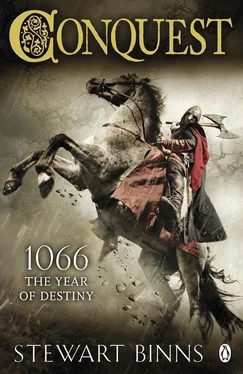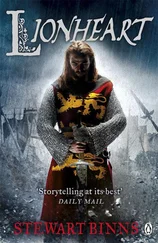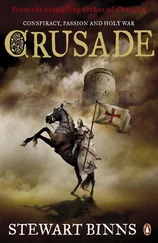‘And your price, my Lord?’
‘A new Danelaw: Lincoln, Nottingham, Gloucester and everything to their north would be Danish. Our capital would be at York. The South would be English.’
‘That is a high price, even for a Dane!’
‘Yes, it is half your kingdom – and we Danes would say it’s the better half! But when you have found ten thousand men, we can haggle about the price. As you know, we have decided to stay for the winter. We thought there would be a few more twists in this tale before it ran its course. Come back and talk in the spring; you will always be welcome here.’
‘Thank you. But you must realize that if I had ten thousand men, I wouldn’t need the support of the Danes.’
‘Perhaps, but William is an awesome opponent. Never underestimate him.’
‘I’ve learned not to. Winter well here in Axholme.’
‘Thank you. Good luck in your noble attempts to rouse your English comrades.’
The two men parted far more amicably than at first seemed possible. At least Hereward now knew the full extent of the dilemma he faced.
It was going to be a long hard winter of reflection in his Pennine eyrie.
Clitheroe Hill, his family and his girls were an uplifting sight as Hereward approached the camp – a home that was beginning to have an air of permanence about it. Gohor’s men had built a wooden hall with a stone hearth for the family, and his men were building longhouses to replace their canvas tents and pelt lean-tos; the Pennines was not a place to be huddled in a makeshift shelter through the long winter months.
Hereward’s band had become smaller. Some men were ill, some had injuries or wounds that refused to heal, and some had asked to go, weary of the fight. When the four squadrons which had been campaigning with Eadric returned, the 80 men who had gone with him had dwindled to 56. A roll-call was taken. Only 268 Englishmen remained at Hereward’s side.
The winter of 1069 was particularly hard. Pen Hill was enveloped by deep snow from mid-November onwards, and the camp was engulfed by several heavy blizzards. At the turn of the year, although it did not seem possible, the weather worsened. Hunting became difficult, even dangerous; nights were long and black; firewood became sparse and spring seemed a long way off. The only comfort was that the dead of winter made England subdued. Few men stirred, offering at least a chimera of peace and tranquillity.
That falsehood was rudely exposed on the Sabbath of the second week of January.
Hereward had sent a scout to York to reconnoitre the disposition of William’s forces and assess the progress of the building of the new Norman city and fortifications. To the scout’s astonishment, within hours of his arrival, he watched as William rode out of the city with a force of nearly 2,000 men. A return to Winchester, in the depths of a winter as fierce as this one, would have been an intrepid move, but Winchester was not his destination; when he passed the new gates of the city, instead of turning south, he turned north.
The scout galloped back to Clitheroe Hill as quickly as his mount would carry him, eager to give his report.
Hereward looked at him in disbelief. ‘How long has it taken you to get back here?’
‘Less than a day, sir.’
Alphonso spoke before Hereward. ‘That is an outstanding ride. Well done!’
‘Thank you, sir.’
Hereward’s mind was racing, realizing what the implications of William’s move might be. ‘That can only mean he’s looking for Edgar and is a day ahead of us. He must have heard that he is not with the Scots and realized that he is in hiding in the North. By the time we’re ready, we’ll have lost another day. Then we have a day’s riding east or west before we turn north; that means he’s got three days on us –’
Einar interrupted. ‘We can get to him in time if we’re a small enough group and don’t mind a bit of snow and hard toil. There is a route up the watershed of the Pennines. There are some high traverses, but it’s not impossible.’
‘How many men?’
‘Twenty, no more. Two horses each, no baggage.’
‘Not many of us if we stumble across two thousand Normans!’
‘The Normans won’t be able to go where we’re going.’
‘We must make haste. Alphonso, you take charge of the camp, organize a series of wide-ranging patrols. I don’t care how bad the weather is, they’re to go as far east as Skipton, west to Preston, south around Pen Hill to the valleys beyond and the settlement at Burnlea, and north over Bowland Trough to the old road at Lancaster. If any Normans come close to Clitheroe Hill, break camp immediately and go north, high into the Pennines, taking only what a horse will carry. Send word of your final destination; we will come and find you. There’s much to do. Let’s get moving.’
Einar led the small troop of men on his hazardous path through the heart of the Pennines. The route went due north; the snow was deep, the rivers icily cold and the wind piercing. Conditions were even worse at a gallop, when faces ached from the chill of the cold air.
It took them four and a half days before, on a bitterly cold but clear day, they crested the summit of their last high traverse and descended into the head of the valley of the Swale. The sky was sapphire blue and cloudless. But rising from the horizon, about twenty-five miles to the east, was a plume of darkness.
‘Richmond.’ It was all Einar needed to say.
Hereward turned to his men. ‘We must hurry.’
As they cantered down the fell, they could see below the tiny specks of a column of men moving along the north bank of the river.
‘Let’s hope that is Prince Edgar and his men, retreating from the Norman advance. Martin, you have the sharpest eyes here, how many men?’
‘No more than fifty.’
‘If it is Edgar, he has lost many comrades.’
It took them nearly an hour to reach the retreating column. They were shocked by the condition of Edgar’s men: they no longer had the bearing of an elite escort for a king-in-waiting. Winter had obviously taken its toll on them; they were dirty, their weapons and horses neglected, and they had the vacant stare of men who were cold and hungry.
Hereward immediately sent a patrol down the valley of the Swale to determine the Normans’ progress. He ordered fires to be lit, hot food prepared and instigated the familiar routines of soldiers. With the wintry sun offering a little warmth, Edgar and his men were made to take a quick plunge in the Swale, cut their hair and beards, clean their armour, sharpen their weapons, and feed and groom their horses. Only then were they allowed to relax by the fires while Hereward and his troop fed them bowls of broth and bread.
When they had eaten, Hereward gave them a short but inspiring speech. It ended with a simple rallying cry: ‘Your responsibility is the greatest of all. You ride with England’s only hope – Edgar, the rightful King. Keep him safe. Do this for me. Do this for our people!’
Prince Edgar then told Hereward the grim tale of his winter in Upper Swaledale.
‘It has been awful here. Usulf, the man Einar spoke of, died a couple of years ago and when we arrived, the locals fled, taking everything with them. There isn’t much game up here in the middle of winter and we were reluctant to venture too far down the valley, so we had to scavenge for whatever we could find. The men became restless; many deserted, some in broad daylight. Then, about a month ago, one of Cospatrick’s spies in York heard a rumour that William was planning a major campaign for the New Year.’
‘So it is true? William is looking for you?’
‘Only in part. The word is that he spent every night before Christmas getting blind drunk, bellowing that he was going to rid England of its vermin once and for all, burn every house and slaughter every animal. As soon as they heard the spy’s story, Cospatrick and Waltheof left for their earldoms to protect their communities.’
Читать дальше












